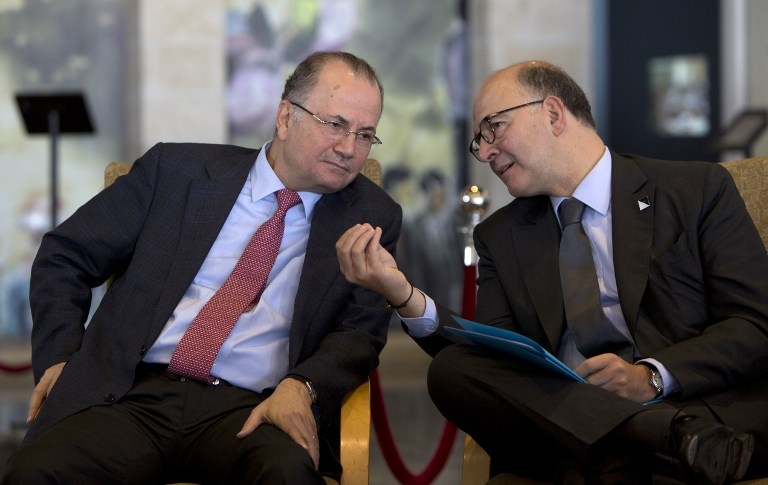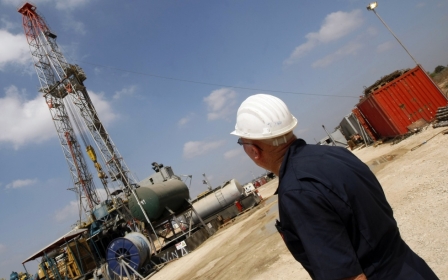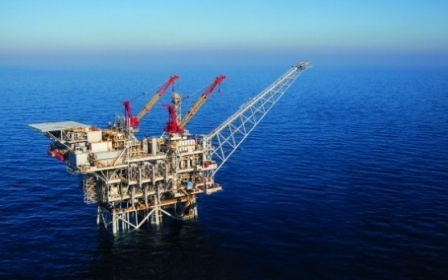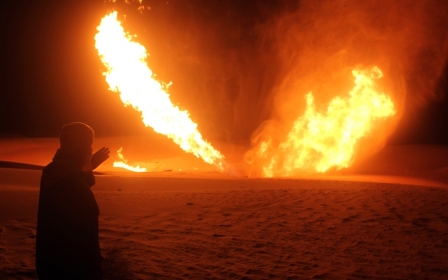Dispute breaks out over Palestinian-Israeli gas deal

A $1.2bn deal to supply Palestinians with Israeli gas was in question Wednesday after a clear dispute broke out between companies involved in the deal and the Palestinian Authority about whether the deal could be cancelled - or if it was even still on the table.
A source close to the US and Israeli companies which would supply gas from Israel's largest offshore field, Leviathan, to the Palestinian Power Generation Company (PPGC) for 20 years told MEE on Wednesday morning that the deal, signed last January, was still in play. Israel’s Ministry of National Infrastructure, Energy and Water Resources spokesperson Anat Aviram told MEE on Wednesday that the ministry was “not aware to any new information on the subject.”
And neither Israel's Delek Group, nor the the US-based Noble Energy, both publicly traded companies required by law to report significant business developments to their shareholders, have filed any paperwork with the US Securities and Exchange Commisison or the Tel Aviv Stock Exchange indicating the deal has ended.
But late Wednesday, Omar Kettani, chief of the Palestinian Energy Authority, told MEE that such deals require government approval and PPGC never submitted a request to the Palestinian Authority.
Kettani's comments follow on from a statement released to local Palestinian media on Sunday by Mohammed Mustafa, the Palestinian Deputy Prime Minister, Minister of National Economic Affairs and Chairman of the Palestinian Investment Fund (PIF) board, which also cast doubt on the future of the deal.
The PIF, the Palestinian Authority’s sovereign wealth fund which Mustafa has led since 2005, is one of the founding shareholders of PPGC with a 10 percent sharehold, according to the PIF website. Mustafa denied that the natural gas supplying PPGC’s power plant will be Israeli. “The government can never accept this, nor approve of it,” he said.
PPGC’s board of directors insists that it will only use Palestinian natural gas to power its new plant and decided last summer to stop the agreement to take gas from Israel, Mustafa said.
Gas from the deal was to be used to fuel a $300m gas-fuelled power plant which PPGC intends to build in Jenin which would be the first power plant in the West Bank. The only other Palestinian power plant in Gaza, damaged during the war in Gaza this summer, started operations in 2004.
Mustafa and Kettani said that BG Group plc, which holds the license to a gas field off Gaza's shores, has presented or is in the process of presenting offers to sell Palestinian gas, presumably from the Gaza field, to Palestinian companies.
Discovered in 1999, the gas has stayed in the Gaza Marine field for more than a decade as negotiations with potential buyers have reportedly remained in deadlock.
When MEE asked BG Group plc for comment about Mustafa's statement, a spokesperson said, “We continue to investigate options for the development of the Gaza Marine Gas. We have not given a date for a final investment decision." She declined to elaborate further.
MEE’s requests for comment from Mustafa and Basem Abdelhalim, whom Bloomberg Business lists as PPGC’s director and who holds an email address with the PIF, were not answered on Wednesday. The PPGC’s website which MEE saw as recently as December appears to have been taken offline.
Mustafa’s statement comes days after a group of Palestinian civil society leaders and politicians called on the Palestinian Authority to pull its backing for the deal, one in a series of gas export agreements signed between Israel and its neighbours, including Jordan and Egypt, in the past year.
“Such an agreement will open the door for Egypt to sign a deal, claiming ‘Palestinians signed. Why shouldn’t we?’ said Khalida Jarrar, a member of the Palestinian Legislative Council, who spoke at a Boycott, Divestment and Sanctions press conference held in Ramallah last week.
Last month, Jamal Qammouh, head of Jordan’s Lower House energy committee, said the country had suspended talks over a $15bn gas deal with the same companies involved in the Palestinian agreement. His comments to Bloomberg came after Jordanian parliamentarians voted on 10 December, in the midst of protests, a Jordanian BDS campaign and a petition against the deal by 8,000 Jordanians.
But a source close to the Jordanian deal told MEE on Wednesday that Qammouh was not the final decision maker and raised questions about whether that deal was still underway despite news reports to the contrary.
Adding another layer of uncertainty to the deals for Israel’s Leviathan gas field, Israel’s Antitrust Authority Commissioner David Gilo announced on 23 December that he might designate Delek and Noble’s ownership of the field and another, Tamar, as a cartel and petition their ownership to be reorganised.
On Wednesday, Gilo said he has decided to delay his decision until after Israeli elections on 17 March. Gilo’s announcement came after a Monday evening meeting between government officials and gas industry executives, including those from Delek and Noble, Haaretz reported.
New MEE newsletter: Jerusalem Dispatch
Sign up to get the latest insights and analysis on Israel-Palestine, alongside Turkey Unpacked and other MEE newsletters
Middle East Eye delivers independent and unrivalled coverage and analysis of the Middle East, North Africa and beyond. To learn more about republishing this content and the associated fees, please fill out this form. More about MEE can be found here.




